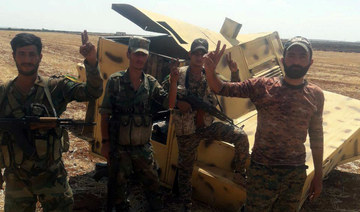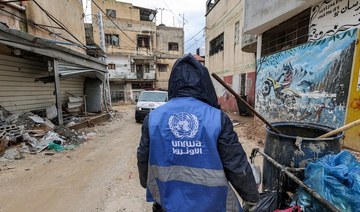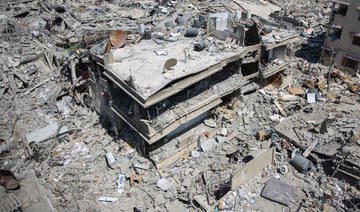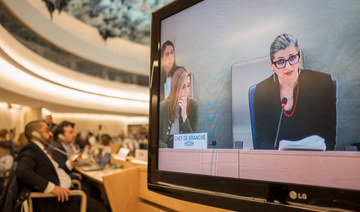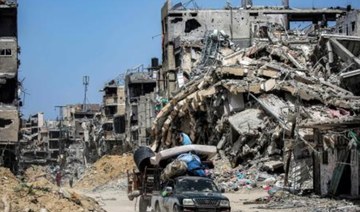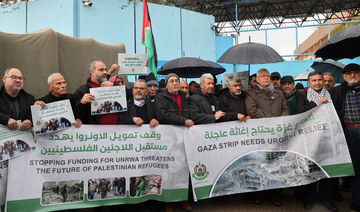BEIRUT: Turkish Foreign Minister Mevlut Cavusoglu on Friday said Ankara wants “a political solution to the Syrian crisis,” and that its soldiers “will not leave the besieged observation post south of Idlib” after Syrian regime forces took control of the area.
The recent advances by Bashar Assad’s forces have put Turkish troops stationed in the region in the firing line and displaced hundreds of thousands of people, threatening Ankara’s hopes of preventing a fresh wave of refugees on its southern border.
Speaking at a press conference in Lebanon, Cavusoglu said: “We are not there because we are unable to leave but because we do not want to.”
He denied that the Turkish forces are isolated in Morek, where their largest observation post is based. He said: “This post is not encircled, and no one can isolate it. The Syrian regime forces are leading activities in the vicinity of this post, we are discussing this with Russia and Iran.”
His comments followed a telephone conversation between Russian President Vladimir Putin and Turkish President Recep Tayyip Erdogan. According to the Anatolia Agency, Erdogan told Putin that the “developments in Idlib would cause a major humanitarian crisis” and “undermine the process of reaching a settlement in Syria and pose a serious threat to Turkish national security.”
Cavusoglu met with Lebanese President Michel Aoun, Parliament Speaker Nabih Berri, Prime Minister Saad Hariri, and Foreign Minister Gebran Bassil.
Rafic Chlala, the media adviser to Aoun, told Arab News: “The Turkish official gave a presentation on the current military developments in Idlib, and a view of the future was delivered, but he did not ask anything from Lebanon.”
During a joint press conference with Bassil, Cavusoglu said: “Turkey will exchange experiences with Lebanon to return Syrian refugees to their country. Ankara understands Beirut’s suffering from the refugee crisis.”
He added: “Syrian refugees are afraid of returning to their country. This fear must be dispelled, and the international community should give greater importance to meeting the basic needs of Syrians.”
Lebanon hosts over 1 million Syrian refugees, according to the UN High Commissioner for Refugees. Beirut estimates the real figure is over 1.5 million.
Cavusoglu proposed “to organize a joint forum with Lebanon, Jordan and Iraq on the return of Syrians and invite the international community to participate.”
During his meeting with Cavusoglu, Aoun said: “The international community’s continued disregard for the need for Syrian refugees to return to their country raises many questions.”
According to his media office, Aoun said the return of displaced people to their homes remains a common concern for Lebanon and Turkey. He reiterated that the provision of international assistance to refugees inside Syria is an important incentive for their return.
Aoun added: “Until now, Syrian refugees who have returned to Syria under the supervision of the Lebanese General Security did not suffer any persecution. The process of returning refugees will continue in turn.”
Cavusoglu said that Turkey shares Lebanon’s stance in supporting the return of refugees.
He told Aoun that Turkey will vote for Lebanon to establish the Human Academy for Encounter and Dialogue when the item is submitted to the UN on Sept. 13.
Berri’s media office said that talks with Cavusoglu included “the general situation in the region, the need to uphold the legitimate rights of the Palestinian people, the importance of a political solution in Syria that ensures its unity and sovereignty and the return of refugees.”
Cavusoglu said: “Turkey views Lebanon as a neighbor and a sister country. The stability and growth of this country are very important for us and the region. We will continue to support Lebanon, and many Turkish energy companies want to invest there.”
The Turkish president will visit Moscow on Tuesday for a meeting with his Russian counterpart, the presidency said in a statement, days after a Turkish convoy was hit by an airstrike in Syria.
Kremlin spokesman Dmitry Peskov confirmed the Putin-Erdogan meeting on Aug. 27 to the Russian agencies.
Turkey vows not to quit besieged army post in Syria
Turkey vows not to quit besieged army post in Syria
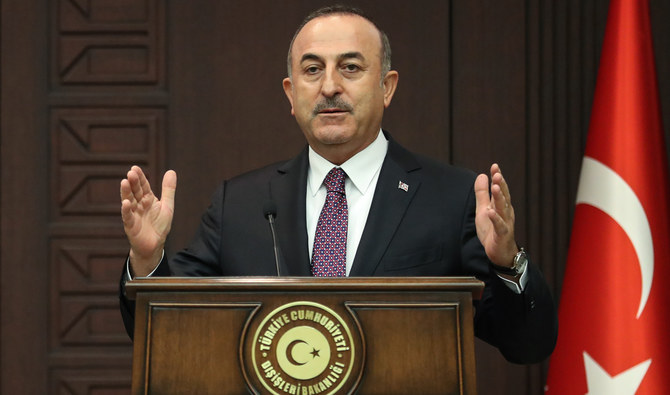
- Calls for a ‘political solution’ to the crisis
Hamas armed wing Al-Qassam Brigades calls for escalation across all fronts
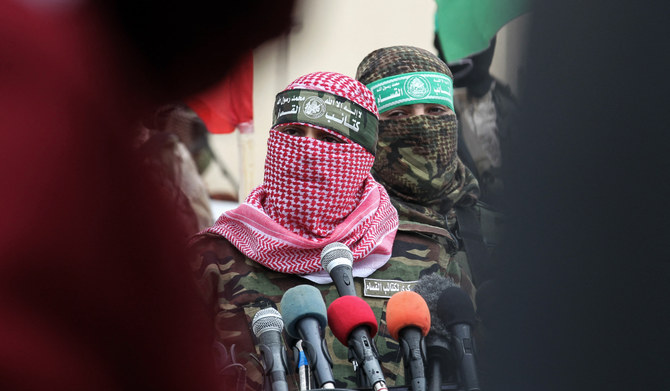
- Israel has killed more than 34,000 Palestinians, according to Gaza’s Health Ministry
DUBAI: The spokesperson for Hamas’ armed Al-Qassam Brigades, Abu Ubaida, called on Tuesday for an escalation across all fronts in a televised speech marking 200 days since the start of the Israel-Hamas war in the Gaza Strip on Oct. 7.
Israel says it is seeking to eradicate Hamas, which controls the enclave, in a war that has killed more than 34,000 Palestinians thus far. The war started when the militant group attacked Israel, killing 1,200 and taking 253 hostages, according to Israeli tallies.
In a video aired by Al Jazeera TV, Abu Ubaida praised Iran’s attack on Israel on April 13, saying the direct strikes with explosive drones and missiles “set new rules, drew important equations, and confused the enemy and those behind it.”
He also called for an escalation in the West Bank and Jordan calling it “one of the most important Arab fronts.”
Jordan, which lies between Iran and Israel, intercepted and shot down dozens of Iranian drones that entered its airspace and were heading to Israel, two regional security sources said on April 13.
“We call on the Jordanian people to step up their actions and raise their voices,” Abu Ubaida said.
He said Hamas was sticking to its demands at the ongoing ceasefire talks — that Israel ends its military offensive, pulls out forces from Gaza, allows the displaced to return to northern Gaza, and lifts the blockade.
“The government of the occupation is stalling in reaching a hostages-swap deal and is trying to obstruct efforts by the mediators to reach a ceasefire agreement,” Abu Ubaida said.
Qatar and Egypt have been trying to mediate a ceasefire, but Qatar foreign ministry’s spokesman said earlier on Tuesday all concerned parties should “show seriousness” in allowing such efforts to succeed.
‘We will leave no stone unturned to shield UNRWA from ferocious attacks,’ says agency chief
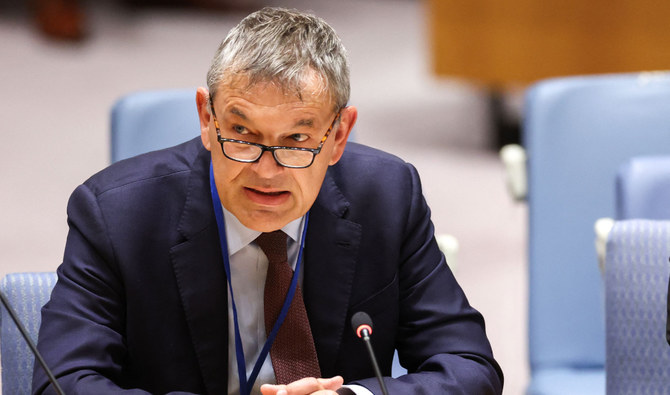
- Philippe Lazzarini says many supporters of each side in Israeli-Palestinian conflict fail to feel empathy for those on the other and so demonize them
- ‘The peace process, per se, is not enough; what we need is healing,’ he tells Arab News
NEW YORK CITY: The head of the UN agency that helps to provide aid and development for Palestinian refugees told Arab News on Tuesday that no effort will be spared to protect it from “ferocious attacks” by its critics.
And as protests related to the war in Gaza continue to cause friction around the world, including growing rows on US college campuses, Philippe Lazzarini, the commissioner general of the UN Relief and Works Agency for Palestine Refugees, said many of the supporters of each side in the conflict are unable to feel any empathy for those on the other, and so they demonize them.
“The peace process, per se, is not enough,” he added. “What we need is healing.”
Lazzarini said he has been struck by the fact that “empathy in this part of the world is most of the time unilateral. It’s either empathy only for the Palestinians, with no understanding where the Israelis are coming and the trauma that Oct. 7 has created in the country, or empathy only for Israelis, with absolutely no empathy for the Palestinians.”
He said his main message to US students is the need to show “compassion and empathy” for both peoples, “because ultimately, we expect that Israelis and Palestinians will live, and deserve to live, in peace and security.”
UNRWA has never been under attack to the extent it has been in recent months, Lazzarini said.
“It has never been in a situation where at same time 18 countries are reviewing or freezing their contributions,” he added. “It has never been the target of an open campaign for the total dismantlement of its activities in Gaza, and possibly beyond. What we are going through is quite unique in its ferocity.”
Agency staff and the communities they serve are “deeply anxious” about the possibility it might be weakened or even dismantled, he said, pointing to an opinion poll in which between 80 and 90 percent of Palestinians in Gaza and the West Bank expressed such fears.
“We will leave no stone unturned and we will bring the conversation where it needs to be to avoid the agency’s dismantlement,” said Lazzarini.
He added that this has been the mindset since the crisis the agency is facing was brought to the attention of the UN General Assembly in March, and was on display again last week during a meeting of the Security Council requested by Jordan in response to long-running attempts by Israeli authorities to force the agency out of Gaza.
“Now we are looking at the next, best avenue to shield the organization from these kind of attacks,” he added.
The agency, which provides aid and other services to millions of Palestinian refugees in Gaza and throughout the region, was thrown into crisis in January when Israel alleged that 12 UNRWA workers took part in the Oct. 7 attacks by Hamas against Israel.
In a report published on Monday, an independent team of investigators led by former French foreign minister Catherine Colonna, reported that Israeli authorities have yet to provide any evidence to back up their allegations, and had not previously expressed concerns about any individuals named on the lists of UNRWA staff they had been receiving since 2011.
In the immediate aftermath of the Israeli allegations, the US, the biggest single funder of the agency, and several other major donors immediately put their funding for the organization on hold. In all, 18 UN member states suspended or paused donations, while others imposed conditions, placing the very future of the agency in doubt. Many later resumed their donations.
Speaking to reporters at the end of an official visit to New York, Lazzarini once again said that he believes the attacks on UNRWA were not truly motivated by concerns about the neutrality of its staff, but rather the primary objective was to strip Palestinians of their refugee status.
Israel has long accused the agency of deliberately perpetuating the refugee status of millions of Palestinians, an allegation Lazzarini describes as “nonsense.”
“Basically, it is as if you would say that the humanitarian response in a conflict zone is perpetuating the conflict,” he said.
“The reality is that it is perpetuated because of the absence of a political solution. UNRWA was geared to be a temporary organization, hoping to end its activities the day there is a lasting and fair political solution. And here we are, 75 years later; it’s certainly not UNRWA perpetuating the status (but) our collective inability to promote a solution.
“If we have a genuine desire for a two-state solution, and we revitalize the implementation of such a solution, UNRWA’s temporary nature can be reinstated and hence UNRWA can pave the way for the future (Palestinian) state to provide the services the agency is providing.”
Since the beginning of the war in Gaza in October, 180 agency staff have been killed, more than 160 UN premises have been damaged or destroyed, and at least 400 people have been killed while seeking shelter under the flag of the UN.
Premises UNRWA staff were forced to abandon reportedly have been taken over and used for military purposes by the Israeli army, Hamas or other armed groups. Several agency workers have been arrested or mistreated, some have been tortured.
Lazzarini urged the Security Council to order an independent investigation into such incidents and for those responsible for the “blatant disregard” they have displayed toward UN premises, staff and operations in the Gaza Strip to be held accountable, so as to avoid setting “a new low standard in future conflict situations.”
The attacks on UNRWA and its work continue even as fears grow that warming weather will bring with it disease and other health risks. This is especially a concern in southern Gaza, which has become the last refuge for more than a million people forced by fighting to flee other parts of the territory, and where Lazzarini said “garbage collection has become a priority for our colleagues to prevent disease outbreak,” amid the “key anxiety” among people of a threatened, “possibly looming, upcoming military offensive” by Israel, “which seems to be back on the table.”
The report submitted by Colonna’s team after its investigation, which was ordered by the UN to assess whether UNRWA was doing all it could to ensure the neutrality of more than 32,000 workers, includes more than 50 recommendations, including improvements to internal oversight, enhanced in-person training, and additional support from donor nations.
Lazzarini welcomed the report and said he is committed to implementing its recommendations. It is clear from its findings, he said, that “the agency, in reality, has already a number of systems to deal with neutrality issues, far ahead of the average UN agencies or even (nongovernmental organizations), and because of the complexity of the environment we are operating in we need to be extremely vigilant, and we can always do more.”
He expressed his hope that as a result of the report and the measures that will be put in place, “the last group of donors will get the necessary confidence to come back” to the agency.
However, he noted that US will not provide any more donations until at least March 2025 because of a lack of political support for UNRWA in Washington, and added that “my task now is to try to bridge the gap” in financing that currently exists “and see that funding covered until the end of June.”
Fears grow for Rafah as Israel-Hamas war rages on 200th day
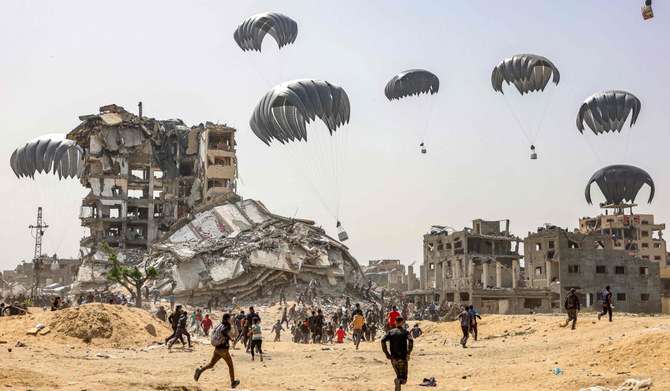
- Citing Egyptian officials briefed on the Israeli plans, the Wall Street Journal said Israel was planning to move civilians from Rafah to nearby Khan Yunis over a period of two to three weeks
- Israel has killed at least 34,183 Palestinians, most of them women and children, according to the health ministry in the Hamas-run territory
GAZA STRIP, Palestinian Territories: The Israel-Hamas war entered its 200th day on Tuesday as aid groups warned that Israeli plans to invade the southern city of Rafah where most Gazans have taken refuge would create an “apocalyptic situation.”
Fears have been rising that Israeli Prime Minister Benjamin Netanyahu will soon follow through on repeated threats to send troops into Rafah, where 1.5 million people have sought shelter, many in makeshift encampments.
“Everybody seems to be on a countdown to war across the largest displacement camp on Earth, which is Rafah,” Norwegian Refugee Council chief Jan Egeland told AFP.
Egeland warned that a ground assault on Rafah would be an “apocalyptic situation” and that humanitarian groups “are completely in the dark on how to mitigate this countdown to a catastrophe.”
Also on Tuesday, the United Nations rights office said it was “horrified” at reports of mass graves found at the Gaza Strip’s two biggest hospitals after Israeli sieges and raids.
Israel has repeatedly targeted Gazan medical facilities during the war, accusing Hamas of using them as command centers and to hold hostages abducted on October 7. Hamas denies the accusation.
Over the past three days, Gaza’s Civil Defense agency said nearly 340 bodies were uncovered of people killed and buried by Israeli forces at the Nasser Hospital in the southern city of Khan Yunis.
Israel’s army responded by saying that claims it had buried Palestinian bodies were “baseless and unfounded,” without directly addressing allegations that Israeli troops were behind the killings.
The army said that “corpses buried by Palestinians” had been examined by Israeli troops searching for hostages and then “returned to their place.”
UN rights chief Volker Turk called for an “independent” probe into the deaths at Nasser and Gaza City’s Al-Shifa hospitals, noting the “special protection” awarded to medical facilities under international law.
UN rights office spokeswoman Ravina Shamdasani said some of the bodies found at Nasser were allegedly “found with their hands tied and stripped of their clothes,” adding that efforts were underway to corroborate the reports.
AFP images from the scene showed numerous bodies under white shrouds in front of the bombed-out Nasser Hospital.
The White House said it would discuss the subject with Israel.
“Obviously scenes of mass graves in general are deeply concerning but I don’t have anything that can confirm the veracity of those,” US National Security Council spokesman John Kirby told reporters.
The Israeli army carried out intense shelling overnight of Gaza City, AFP correspondents and witnesses said.
Shelling and loud explosions were heard in southwest Gaza and Khan Yunis city, while strikes hit the Bureij and Nuseirat refugee camps in central Gaza.
The war began with an unprecedented Hamas attack on October 7 that resulted in the death of around 1,170 people, according to an AFP tally of Israeli official figures.
In retaliation, Israel launched a military offensive that has killed at least 34,183 people in Gaza, mostly women and children, according to the health ministry in the Hamas-run territory.
The Israeli army announced the death of a soldier in Gaza, raising its toll to 261 since the ground operation began.
Israel estimates that 129 of the roughly 250 people abducted during the Hamas attack remain in Gaza, including 34 who the military says are dead.
Public pressure has mounted on Netanyahu’s government to strike a truce deal that would secure the release of the remaining hostages.
Abu Obeida, spokesman for Hamas’s armed wing, said that “after 200 days, the enemy remains trapped in the sands of Gaza” and the hostages would “most likely” not return home soon.
At a rally near Netanyahu’s home in the coastal town of Caesarea, protesters including relatives of hostages set fire to a symbolic Passover table at the start of the week-long Jewish holiday on Monday.
Dalit Shtivi, whose son Idan was kidnapped on October 7, said she was struggling to cope without him during Passover, also known as the “holiday of freedom.”
“It’s so hard. I cannot explain the pain. I cannot... think of celebrating without him,” she said.
Outcry has been growing around the world against Israel’s offensive, which has turned vast areas of Gaza to rubble and sparked fears of famine.
Hundreds of students have been arrested in recent days at pro-Palestinian demonstrations on the campuses of prominent universities in the United States, Israel’s top ally and military supplier.
In Gaza, the United Nations says “multiple obstacles” continue to impede delivery of urgently needed aid for Gazans desperate for food, water, shelter and medicine.
But Netanyahu has vowed to press on with a planned offensive on Rafah, on the besieged territory’s border with Egypt.
Citing Egyptian officials briefed on the Israeli plans, the Wall Street Journal said Israel was planning to move civilians from Rafah to nearby Khan Yunis over a period of two to three weeks.
Satellite images shared by Maxar Technologies showed tent camps that had recently been set up in that area.
The Journal reported that Israel would then send troops into Rafah gradually, targeting areas where Hamas’s leaders are thought to be hiding, in a military operation that would last six weeks.
The European Union’s humanitarian chief Janez Lenarcic called on international donors to fund the United Nations agency UNRWA, which has been central to aid operations in Gaza.
His comment came after a much-awaited independent report found that “Israel has yet to provide supporting evidence” for its claim that UNRWA employs “terrorists.”
The report did find “neutrality-related issues,” such as agency staff sharing biased posts on social media.
After the report was released, UNRWA chief Philippe Lazzarini called for an investigation into the “blatant disregard” for UN operations in Gaza, adding that 180 of the agency’s staff have been killed since the war began.
While some countries have renewed funding for the agency, the US and Britain are among the hold-outs.
The White House would “have to see real progress” before it restores funding, Kirby said.
The Gaza war has triggered violence across the region, with deadly cross-border exchanges on Tuesday between the Israeli army and Lebanon’s Hezbollah, a Hamas ally.
The Iran-backed Lebanese group said it launched drones at northern Israeli army bases in retaliation for a strike deep into Lebanon that killed a Hezbollah fighter.
A woman and a girl were killed in an Israeli strike on southern Lebanon later on Tuesday, local rescuers and official media said.
Gaza doctors process 200 days of war from devastated hospital’s rubble
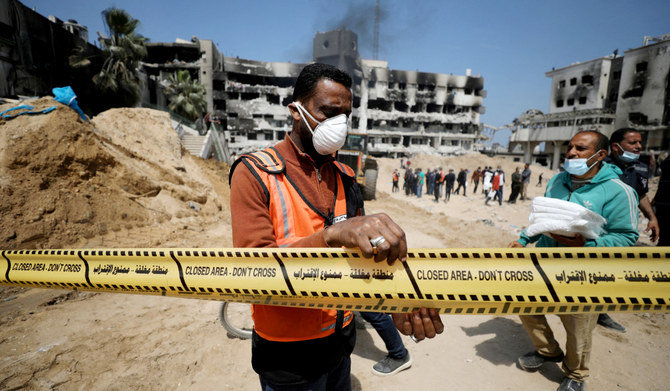
- UN Human Rights Chief Volker Turk said he was horrified by the hospital’s destruction and demanded an independent investigation
- Israel has killed 34,183 Palestinians in Gaza, mostly women and children, according to the health ministry in the Hamas-run territory
GAZA CITY, Palestinian Territories: Emergency doctor Amjad Alewah once saved lives at Al-Shifa hospital, the largest medical facility in the Gaza Strip.
But after 200 days of war between Israel and Hamas militants, he now stands in its ruins.
“We are now in the middle of the rubble of this great hospital,” Alewah, who returned to inspect the now charred emergency reception room, told AFP.
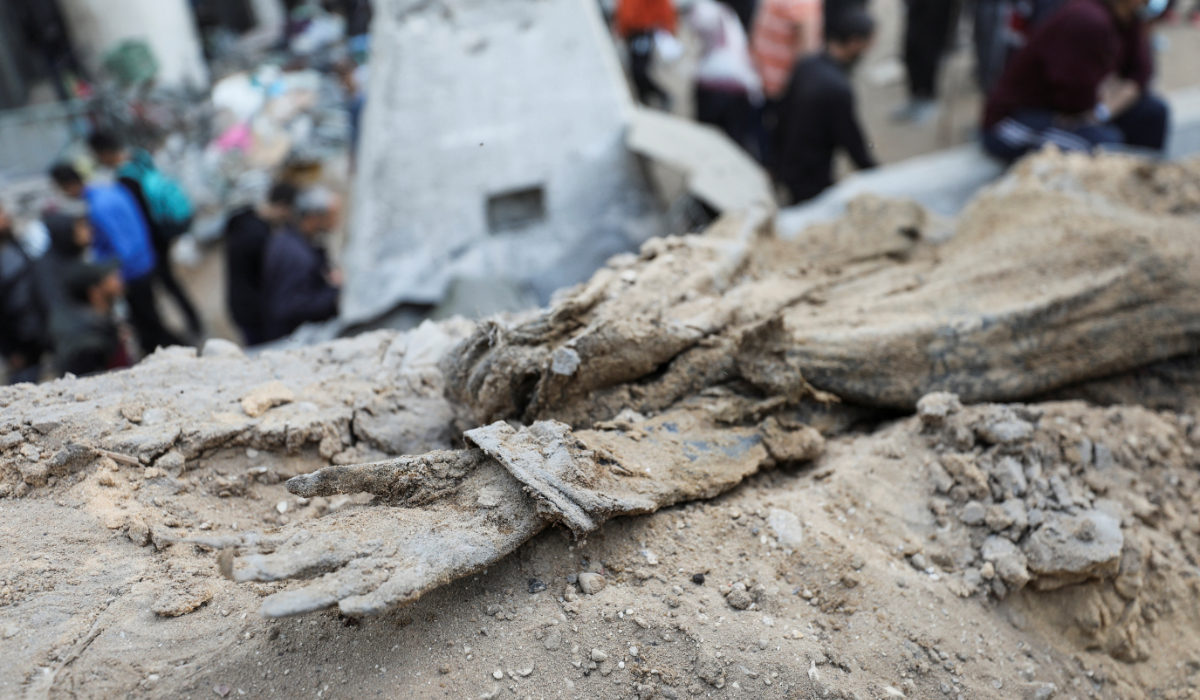
Following the outbreak of war, Al-Shifa became a safe haven for the thousands injured or fleeing the Israeli onslaught on the Palestinian territory.
“Every day, we received thousands of wounded,” he said, recalling having to work without enough medical equipment or fuel for electric generators.
“We had picked up the habit of spending all our time here, as if it was our main residence.”
But war came to Al-Shifa, with Israel launching multiple raids on the medical facility after accusing militants of operating a command center from tunnels below.

The Israeli military said two weeks of fierce fighting last month killed over 200 militants and recovered weapons.
Hamas, which rules Gaza, denies using the hospital for military purposes.
Footage of the complex filmed by AFP after two weeks of siege between March 18 and early April shows a site laid to waste.
UN Human Rights Chief Volker Turk said he was horrified by the hospital’s destruction and demanded an independent investigation.
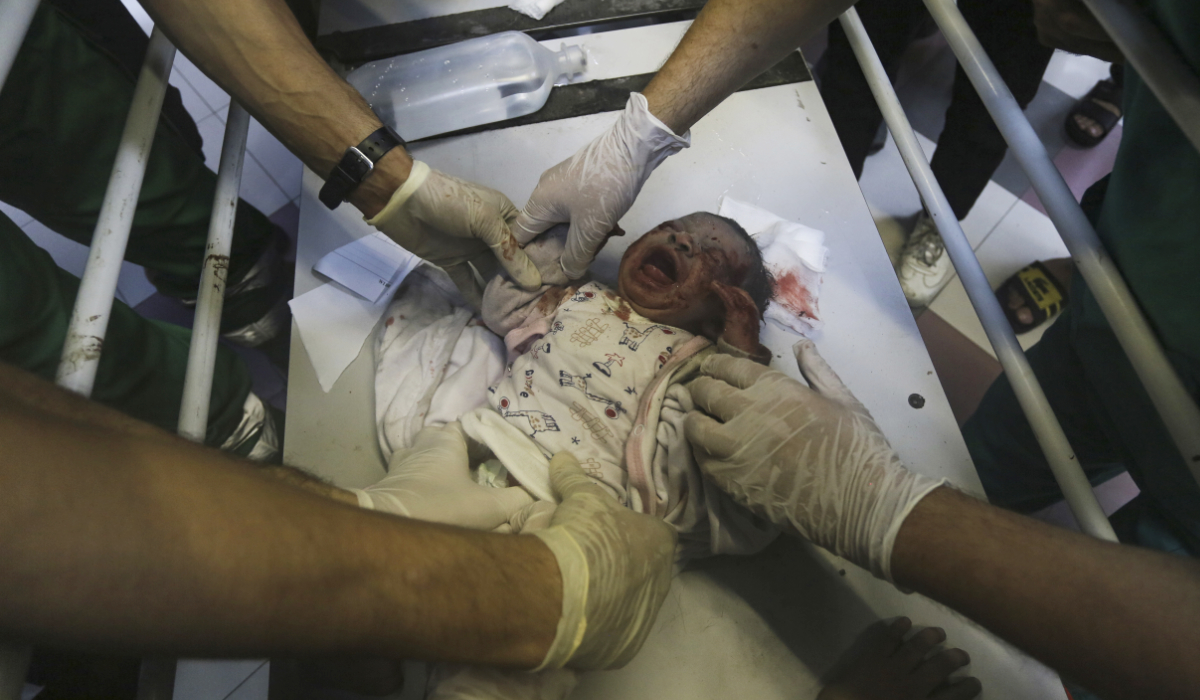
“Hospitals are entitled to very special protection under international humanitarian law,” he said.
Alewah said he was saddened by the destruction of a “cornerstone of health for the whole north of the Gaza Strip,” calling on the international community and World Health Organization (WHO), which visited Al-Shifa to assess damages, to help rebuild.
“We’re lacking operating theaters to treat patients, particularly patients on dialysis or those with heart conditions.”
A rehabilitation medical committee has already been put in place, its head, Marwan Abu Saada told AFP, adding that they were working on building an emergency department in another part of the hospital complex.
“We will not lose hope,” he repeated, despite acknowledging the difficulty of the task at hand.
As many as 32 hospitals and 53 dispensaries are out of commission due to the war, according to the latest figures from the health ministry in Hamas-run Gaza, while 77,100 people are wounded across the territory.
“We want the war to end,” said Adham Qneita, a resident of Rimal, a neighborhood adjacent to the hospital.
Speaking in front of the devastation of flattened apartment buildings, he said he wished “only for death.”
“Nobody cares about us,” he told AFP.
The war between Israel and Hamas erupted when the group’s fighters launched an unprecedented attack on the country on October 7, resulting in the deaths of 1,170 people, mostly civilians, according to an AFP tally based on official Israeli figures.
Israel vowed to eliminate Hamas and its ensuing military offensive in Gaza has killed at least 34,183 people, most of them women and children, according to the Gaza health ministry.
Head of UN agency for Palestinians urges probe into staff killings

- Lazzarini stressed an investigation was necessary “to have accountability, in order not to set a new low standard in future conflict situations,” Lazzarini said
UNITED NATIONS, United States: The director of the United Nations agency for Palestinian refugees hit back at Israel Tuesday, calling for a Security Council probe into the “blatant disregard” for UN operations in Gaza after some 180 staffers were killed.
Philippe Lazzarini also revealed that the United Nations Relief and Works Agency (UNRWA) had been able to partly offset a funding shortfall by raising $100 million from online donations since the Israel-Hamas conflict broke out in October.
His comments came a day after the release of an independent review that said Israel had not yet provided evidence supporting its claim that hundreds of UNRWA staff were members of terrorist groups. The review did, however, identify “neutrality-related issues” within the agency, for example in employees’ social media posts.
While accepting the findings of the review, Lazzarini told reporters that attacks on UNRWA’s neutrality “are primarily motivated by the objective to strip the Palestinians from the refugee status — and this is a reason why there are pushes today for UNRWA not to be present” in Gaza, east Jerusalem and the West Bank.
UNRWA was established in 1949 to serve Palestinians who lost their homes in the 1948 Arab-Israeli conflict, as well as their descendants. There are now 5.9 million registered Palestinian refugees.
Lazzarini said that he recently “called on the members of the Security Council for an independent investigation and accountability for the blatant disregard of UN premises, UN staff, and UN operations in the Gaza Strip.”
As of Tuesday, 180 UNRWA staff have been killed in the war, 160 premises have been damaged or destroyed, and at least 400 people have been killed while seeking the protection of the UN flag, Lazzarini said.
Vacated UNRWA premises have been used for military purposes by the Israeli army or Hamas and other militant groups, while UNRWA staffers have been arrested and even tortured, he added.
Lazzarini stressed an investigation was necessary “to have accountability, in order not to set a new low standard in future conflict situations,” Lazzarini said.
Allegations by Israel in January that some UNRWA staff participated in the Hamas attacks led to many donors freezing some $450 million in funding at a time when Gaza’s 2.3 million people are in dire need of food, water, shelter and medicine.
Many countries have since resumed their donations, while others, including the United States — which passed a law blocking funding until at least March 2025 — have not.
“In terms of our funding of UNRWA, that is still suspended. We’re gonna have to see real progress here before that gets changed,” White House National Security Council spokesman John Kirby said Tuesday.
Lazzarini said UNRWA was operating “hand to mouth for the time being” but said that online fundraising to the agency totaled $100 million since October 7, in “an extraordinary indication of grassroots solidarity.”
Israel has repeatedly equated UNRWA with Hamas, the militant group responsible for the October 7 attack which resulted in the death of around 1,170 people, mostly civilians, according to an AFP tally of official Israeli figures.
At least 34,183 people in Gaza, mostly women and children, have been killed in Israel’s retaliatory bombabardments and ground offensive, according to the health ministry in the Hamas-run territory.



